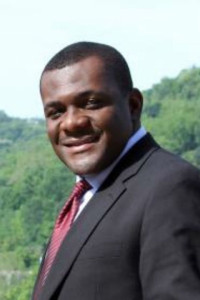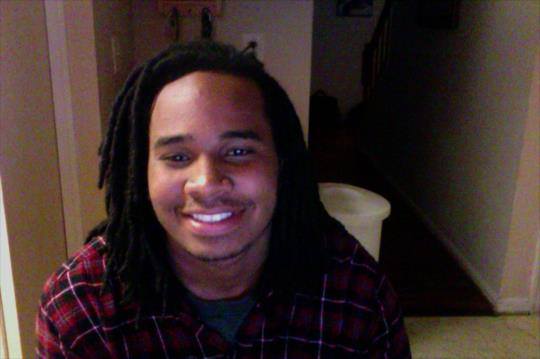“This is their place”: Dr. Kumah-Abiwu Visits Frostburg State

On Tuesday, Feb. 25th, Dr. Felix Kumah-Abiwu presented “Decoding Media Gatekeepers and their Portrayal of Males in America” to the Frostburg State University campus community and members of the local community in the Atkinson Room in the Lane University Center.
Dr. James Saku, a geography professor at FSU, introduced Kumah-Abiwu as a “very energetic person,” promising an entertaining presentation.
Kumah-Abiwu currently teaches Pan-African Studies at Kent State University. He earned his B.A. in Political Science & History at the University of Ghana, M.A. in International Affairs at the University of Ghana and Ohio University, and an M.A. in Political Science from West Virginia University before earning a Ph.D. in Political Science at West Virginia University. His education was inspired by his father who was a diplomat.
“It is an honor and a privilege to be back in Allegany County,” Kumah-Abiwu said to those in attendance at the beginning of his presentation. He prompts some chuckles from the audience discussing his familiarity with the infamous Frostburg weather and Interstate 68 before expressing his gratitude for Saku, the FSU leadership, and the community members. Kumah-Abiwu also conveys the importance of the event as it is part of the Black History Month celebrations.
“Happy Black History Month,” Kumah-Abiwu exclaims, continuing to explain 2019 was the 400th anniversary of Africans being brought to the New World. He took some time to “honor and salute those survivors and historical leaders who survived the journey,” recognizing Martin Luther King Jr., Harriet Tubman, the African American women of NASA, and the importance of strong active voices that bring out “strong voices everywhere.” Kumah-Abiwu thanked allies of all races.
Kumah-Abiwu starts to discuss different dialogue issues and shared he reminds his students “our great great greats have achieved a lot.” He emphasizes the importance of celebrating the achievements of African descent while also understanding the painful past. Kumah-Abiwu argues “this is their place, no one can say they don’t belong here,” continuing to explain there is no point in diminishing the past accomplishments of the millions of great leaders from the past.
Transitioning into the bulk of his presentation, Kumah-Abiwu introduced his three perspectives: “Blackness” and black males in America, challenges facing black males, and progress and possibility.
“The problem is that color is a defining factor in American society,” Kumah-Abiwu remarked. “The problem is the labels associated with colonialism. Blackness is associated with negativity.”
Kumah-Abiwu discusses the “mind-blogging” nature of media portrayals of black males highlighting the challenges they often face and profiles they must overcome. He highlighted his idea that there are good stories to be told about black males, that it wasn’t all negativity. He credits pioneering thinkers and scholars like W.E.B. Dubois and Carter G. Woodson, as well as contemporary scholars like Shaun Harper, James Moore III, and many others.
He continued talking about the “Obama Factor” which is the decline in racial prejudices, rising rates of interracial marriages, and the decreasing number of black males in prison during and after the Obama administration. Kumah-Abiwu wants to see more black males graduating, more black males chairing business meetings, more black males in the medical field, and more black males inspiring and motivating in the classroom.
After discussing familiar images of black males in the media, the mass incarceration rates of black males in America, and the new Jim Crow, Kumah-Abiwu posed his central question: who are the gatekeepers and how important are they in the portrayals of black males?
Kumah-Abiwu moved into the critical race theory explaining the institutionalization and socialization of racism. He then talked about the white racial frame that defines the difference between the individualistic and systematic interpretations of racism before asking those in attendance, “how do you see America?” He wanted his audience to think about the gatekeepers’ impact on the construction of reality.
Kumah-Abiwu points out the lack of diversity in the NPR newsroom. He brought up two instances in the media – the criminalization a black family faced when their son fell into a habitat at the Cincinnati Zoo and the lack of media scrutiny when a white child was killed by an alligator at Disney World. He pushes his audience to “recognize the importance of what is happening” and to “challenge these dominant, negative narratives.”
Before ending his presentation, Kumah-Abiwu opened the floor up to questions where he discussed the importance of creating inclusive environments and explained that everyone at an “ivory tower” [institution of higher education] has privilege.
“Young black males have potential,” Kumah-Abiwu said. “We just have to recognize it.”




